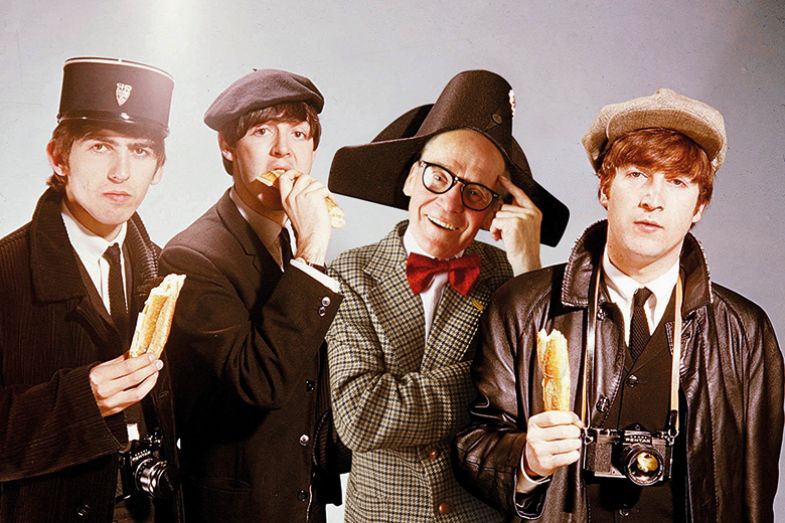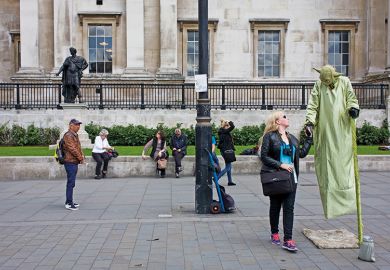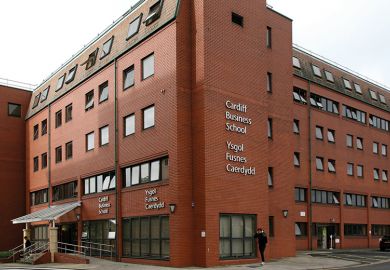‘While impostor syndrome can be frustrating to live with, it might also be a blessing in disguise’
As a long-time sufferer of impostor syndrome, I have learned it can be both a curse and a blessing. Over the years, it has held my professional self-esteem in a perpetual headlock, convincing me that I’m not a “real” academic.
Particularly in my early career, I passed up a number of research and writing challenges, certain that they would only reveal my ineptitude. I have sat silently through conferences, departmental meetings and even academic social events, feeling like the proverbial fish out of water. I still read and reread every article and chapter I write, wondering if the words on the page even make sense. Despite the publications, the promotions and the positive reviews, I have never been able to shake off the sense that, within the hallowed halls of the academy, I simply don’t belong.
Impostor syndrome is hard to live with, and it can take its toll, professionally and personally. Even knowing that many of my talented colleagues are fellow sufferers offers little consolation. I have often tried to pinpoint its causes, but have never quite succeeded. Certainly, I’m aware that gender, ethnicity and class can play a significant role – our identities often impact on the welcome (or lack of welcome) we receive around academia’s very white, middle-class and male high table.
Who we are, where we are from, what communities we belong to – all these factors determine how often our voices are heard and how seriously our research is taken. This, in turn, shapes our own self-perceptions. I feel like an interloper in academia every time a male colleague talks over me in a meeting or a conference panel chair tells me I have a “funny” accent (I’m a Scot living in New Zealand). And while I work in an institution that takes staff equity seriously, significant structural inequalities remain ingrained in academia – both locally and globally – which make so many of us feel like trespassers.
Yet while impostor syndrome can be a deeply frustrating condition to live with, I wonder if it might also be a blessing in disguise. Much of my research involves engaging with social justice issues. Writing for an academic audience, I know that my work is read predominantly by other scholars who share my views. Am I simply preaching to the choir, creating and sustaining endless echo chambers that validate my academic credentials but achieve very little else? I firmly believe that academics are obliged to serve their communities as critic and conscience. But if we refuse to venture outside the academy to spend time in these communities, how can we fulfil this vital role?
A conversation about echo chambers and impostor syndrome was started recently by the University of Auckland’s Critical Theory Network, and it has given me much pause for thought. If we don’t feel at home in the academy, we may be tempted to spend more time in the “real world”, away from our ivory towers, performing and sharing our research with wider, non-academic audiences. Indeed, we could begin doing our research with these audiences, making it relevant, accessible and exciting for more than the handful of academics who share our narrow band of expertise. We could take up our role as critic and conscience more freely, engaging with the political and societal issues that infuse our research with a passion too rarely found in academic publications and conference papers.
If impostor syndrome makes us feel that we don’t belong in academia, maybe we need to discover where we do belong – a place where our work can actually make a difference.
Caroline Blyth is a senior lecturer in theological and religious studies at the University of Auckland.
‘When reviewers rubbish you, it can be difficult to avoid extrapolating to the conclusion that nothing you do has value’
As scientists, we are trained not to draw conclusions until we are 100 per cent sure they are correct. In the case of impostor syndrome, the null hypothesis is “I am not good enough to do this job”, and it can take a whole lifetime to collect the supporting evidence to reject it.
The evidence is particularly hard to gather in academia’s harsh environment. One factor is the high volume of rejection. Grants, papers, job interviews, tenure, promotion: the most likely scenario in each instance is to be turned down. Fundamentally, academic success relies on someone else’s opinion of either your ideas or, even worse, yourself. When anonymous reviewers rubbish you or your ideas, it can be difficult to avoid extrapolating to the conclusion that nothing you do has value.
Indeed, the very act of being judged, even only implicitly, is a contributing factor to impostor syndrome. Examples include standing in front of a lot of people (“a lot” being a flexible term – on some days, three people can feel like a lot), or sitting down in front of fewer, more expert people. This can be plain scary, especially when the standard fight (assaulting the entire conference audience) or flight (running out of the promotion panel screaming) options are ruled out.
For me, an audience of one can be the toughest of all – particularly when it is someone I am close to or hold in esteem. Questions asked out of well-meaning curiosity can be interpreted as all-out assault, especially when I am in a fragile state of mind (following rejection).
In contrast to the inward-facing world of personal rejection, we mostly see our peers advertising their successes. It can feel like everyone else is flourishing when you are not, compounding the feeling of failure. When, a few years ago, people began publishing their “ CVs of failure ”, it was in some ways reassuring. But it still had the capacity to make you feel worthless: “They are even failing at a better level than I am!”
Still, flipping the narrative in this way – sharing the defeats externally and celebrating the wins only internally – can help everyone keep their impostor syndrome under control. Academia doesn’t have to be a zero-sum game, and while it is important to take every opportunity to reinforce your own ego, it doesn’t have to be at the expense of everyone else.
Positive reinforcement is crucial. Some of this can be self-administered. Repeat after me: “I deserve to be here.” If you repeat something often enough, you might start to believe it. But less flippantly, take stock of your achievements. I list goals at the start of the year, and although I might not always attain them, viewed over a longer time period it is reassuring to see how far I’ve come.
Speaking to academic friends is particularly therapeutic in this regard: being reminded that everyone is struggling to the same extent and that you aren’t actually doing that badly. Such peer-to-peer mentoring sessions are easy to organise: they are also known as trips to the pub.
Finally, it helps to remind yourself that even the biggest names are not immune from feeling like frauds. The writer Neil Gaiman once met Neil Armstrong at “a gathering of great and good people”. The first man on the moon said to him: “I just look at all these people, and I think, what the heck am I doing here? They’ve made amazing things. I just went where I was sent.”
My worst attack of impostor syndrome was at a “science in politics” meeting at the Houses of Parliament. There were all sorts of grown-ups there, including ministers, heads of learned societies and science-based television personalities. I was crippled with doubt for the first hour and basically hid in the corner.
Three things helped me out of it. The first was a text from my wife reassuring me that I should be there and that I had something of value to offer. The second was that I found an anchor: a friendly face in the crowd, to whom I could return after forays into the sea of grown-ups. The third was clinging to the thought that since I had made the effort to turn up, I should try to get something from the experience. And I did.
“If Neil Armstrong felt like an imposter, maybe everyone did,” Gaiman reflected on his own struggles with the condition. “Maybe there weren’t any grown-ups, only people who had worked hard and also got lucky and were slightly out of their depth.”
John Tregoning is senior lecturer in the mucosal infection and immunity section of virology at Imperial College London.

‘I told myself that my achievement had less to do with my intelligence than with the emotional cocktail that fuelled my performance’
When self-doubt flares, I cry at home at night, usually with someone I trust. It can be cathartic to ask questions through tears: Will I ever earn a doctorate? Is it possible to combine motherhood with an academic career? Will I earn tenure? Am I destined to publish – or perish? Dare I dream of success as a mathematician and as a writer?
Afterwards, though, I often conclude that self-doubt – the spark that ignites impostor syndrome – is not an option. I am aware of, but choose not to focus on, particular individuals and general gender biases that sometimes threaten to undermine me. An undergraduate professor once suggested that graduate admission committees might decide that my good grades reflected not my hard work but rather my “impossibly long legs”. I ignored his comment despite my own (different) fears and applied to mathematics graduate school anyway. A graduate professor once told my then-pregnant self, point blank, that “mathematics is incompatible with motherhood”. I dismissed his and my own (different) misgivings and became the only woman from my cohort to earn the doctorate – all without maternity leave. A leader at a university where I earned tenure once insisted that I tolerate the harassment that managers acknowledged was occurring. I continued to do my job with heart and intelligence, but insisted on measures ensuring my dignity and safety.
In every situation of bias or harassment, my strong work ethic, good grades, above-average publication record, excellence-in-teaching award and high-profile service positions on university, state and national academic committees did not insulate me from feeling vulnerable. Still, I refused to succumb to self-doubt because doing so would have offered the “bad guys” a win.
Just as tears can be cathartic, so too can anger. Women are often taught to suppress it, but in the face of injustice, anger may be a brave, appropriate response. In the harassment case, the institution eventually provided a safety measure, but only after having allowed the situation to escalate to an intolerable level. Life is too short to remain in settings that require arguing for basic rights, especially when inaction by leaders compounds distress. I decided to leave in search of a better setting. I sought an affirmative answer to my one remaining long-held, then-unanswered question: could I succeed as a mathematician and a writer? Accordingly, I applied to prestigious graduate writing programmes. But impostor syndrome flared: after two decades of obsessing about mathematics, how could I expect my verbal and essay scores on the Graduate Record Exam, which applicants are required to take, to be competitive – especially with only a handful of days to prepare?
On the late December deadline day, I woke at 5am to secure a seat at the only test centre with an open spot. As I pulled out of my driveway, I turned up the radio in the hope of drowning out both self-doubt and sorrow over breaking up with a university I had once loved. The digital thermometer on the dashboard plummeted to −13°F as I stepped on the gas and sang along with Adele at the top of my lungs: There’s a fire starting in my heart…Throw your soul through every open door…Don’t underestimate the things that I will do.
I scored in the 91st and 93rd percentiles, enabling me to feel confident about my chances of admission. Still, I told myself that my achievement had less to do with my presumed intelligence than with the chaotic mix of anger, sorrow and hope that had fuelled my performance. Like a mother who can lift a car to save her baby, I argued internally that this powerful emotional cocktail endowed me with a superhero-like ability to pick the correct answers from the multiple-choice options. According to me, if I had taken the exam on a regular day, I might not have fared as well.
This fantastical story suggests that I remain susceptible to impostor syndrome. I persist despite bumps and bruises because the alternative – surrender – is unacceptable. However, until I build up full immunity to impostor syndrome, I will continue to rely on trusted friends to listen in distressing moments and on the chance to sing my heart out about inner strength while accelerating towards my goals on the coldest, darkest mornings.
Susan D’Agostino is a mathematician, a fellow of the Council for the Advancement of Science Writing, and a graduate student in the MA in science writing programme at Johns Hopkins University. Her first book is due out in 2019.
‘It is as if winning the school athletics festival now means nothing, and every athlete is deemed worthless unless they break world records’
History does not celebrate average people: those who are more talented than half their peers and worse than the other half. That is as true in science and academia as it is in other walks of life. Success is public but failures are private. The only failures one ever sees properly are one’s own.
In some disciplines, academic metrics are now ever-present. While this can provide confidence to those accumulating indisputable lists of achievement, no one is ever top of every table, every time, so the pressure to improve never goes away. In disciplines where metrics are less well developed, feeling respected or feeling excluded can derive from the smallest comments or perceptions, and a fragile equilibrium can easily be broken. Staff can be crushed by one negative appraisal, the failure to secure a grant or a single waywardly savage review of their life’s work.
So it is not surprising that many worthy academics lack confidence, feel insecure and may even see themselves as impostors who have somehow found their way into the inner sanctum but are not worthy of their place and are forever unsure about which way to pass the port. Every move seems to be monitored and judged, and it feels like only a matter of time before they will be weighed and found wanting.
But even the most self-confident, convinced that their prowess bears comparison to any of the historical greats of their discipline, have reason for insecurity – and that includes those in senior positions. As newcomers rise up among the ever-growing throngs of graduates and are appointed on the basis of their universal indices such as citations or grant dollars, it is natural to fear that, justifiably or otherwise, you might soon be deemed not to measure up.
It is very easy to feel that it is no longer sufficient to be a valued member of a local community – someone who is loved and who makes a vital contribution to others’ success and well-being. Small things such as being kind to students or doing extra work to help colleagues can’t be recorded in international databases, so it is natural to conclude that they no longer count.
Actually, though, I don’t think that is an accurate perception. Your values, your conduct and your approach are probably more appreciated than you think. Moreover, academia continues to grow and needs ever more people with talent. By the same token, it is a very old and well-optimised machine – those who have been appointed will have been appointed for a reason, and if they can keep on doing what they have shown they are capable of, the future for even the most psychologically insecure academics often remains bright.
Still, the relentless focus on global excellence is undeniably a strain. It is as if winning the school athletics festival now means nothing, and every young athlete is deemed worthless unless they are breaking world records for their age group. It’s an impossibility, of course: there are only three steps on the Olympic podium. But we’re all encouraged to aim that high. And it makes impostors of us all.
Merlin Crossley is professor of molecular biology and deputy vice-chancellor (academic) at the University of New South Wales.

‘Identifying the socio‑political causes of the impostor experience does not take away individual agency’
Psychologists have sought the causes of impostor syndrome in sufferers themselves, but I am more inclined to interrogate the socio-political context of academic work.
My own experience of feeling incompetent is undoubtedly exacerbated by the awareness of gender biases present in the university setting. Students seem more willing to give positive appraisals to male lecturers despite evidence showing that they perform equally well regardless of their instructor’s gender. There is an acute bias against female authors, too, such that they are less likely to be published and less frequently cited both in academic publications and on reading lists . Even more discouragingly, these phenomena are manifestations of a broader culture whose participants – both men and women – find it difficult to see and value women as serious thinkers . It is hard to entirely avoid being infected – consciously or otherwise – by that omnipresent mindset.
Women with names like mine reputedly have it particularly tough. Although I am not conscious of having been the victim of this bias, hearsay suggests that foreign-sounding names – and especially those complex to pronounce – are perceived as less authoritative and more difficult to market in a knowledge industry dominated by the English language. Again, it is hard to avoid subconsciously internalising that thought, even when you know it is absurd.
Narrowing the focus down to social sciences, what I find particularly difficult to negotiate is the culture of strong argument. There is no doubt that what social scientists study is fluid; irregularity, flexibility and change make it difficult to make definitive statements. Yet we are encouraged by mentors and reviewers to do exactly that.
I remember very well the first article that I submitted to a serious academic journal. The editor, who was no doubt genuinely trying to be helpful, advised me to push my ideas with more confidence: to add fewer caveats and reservations. Yet nuance is what I value most in research, and I don’t feel able to cast it aside for the sake of my career. That, too, makes me feel like something of a misfit.
That sense is further exacerbated by the common emphasis in international relations scholarship on novelty. Publishers are after “the next big idea”, and funders require us to explain how our research is “innovative”. My slow, hesitant research fails on those criteria, too.
Even the narrow confines of my current individual research project – I study knowledge production in Russia – remain beyond my comfort zone. For me, undertaking research means reading and conducting interviews mostly in Russian while writing it all up in English. This means that I am constantly evaluating how I speak and write against the standards of native speakers – and I worry that I come up short.
In addition, the recent escalation of tension between Russia and the West increases the likelihood that even scholarly work will be accused of bias. This means that I have to be equally prepared for charges of Russophobia and of being the Kremlin’s apologist.
But while all these elements have some bearing on my work, they are not paralysing. There are important signs of positive change taking place in my discipline when it comes to diversity. And my skin has thickened: in some areas I have adjusted, and in others I am prepared to defend my approach with more resolve. Identifying the socio-political causes of the impostor experience does not take away individual agency.
Moreover, I have become persuaded that sharing and talking about these experiences with fellow academics and students – who often find themselves under similar pressures – is a good way to ease the symptoms, and perhaps one day even eliminate them.
Katarzyna Kaczmarska is a Marie Curie research fellow in international politics at Aberystwyth University.
‘The real culprit is the unattainable archetype we all have in our heads of the perfect professor’
I have wrestled with impostor syndrome since I first walked into a classroom. My first teaching experience was for a class I had never taken (much less taught), so perhaps feeling like a fraud was justified. I stayed a week ahead of my students throughout the term, and they probably knew it. Most faculty I know have similar stories. Lack of training to prepare us for the classroom certainly contributes to the prevalence of feeling that it is only a matter of time before you are humiliatingly and publicly unmasked.
So does the constant judgement that is part of the academic job description. On top of peer review of our publications and student appraisal of our lectures, my institution puts all junior faculty through an exhausting and time-consuming evaluation process. When I was subject to it, I felt poked and prodded and unsure of how glad I should be to be judged worthy of remaining, to receive the same treatment the following year. But now, as a tenured faculty member, I put junior faculty through the same harrowing experience, and call my judgement “mentoring”.
But I’ve come to believe that the real culprit, when it comes to exacerbating impostor syndrome, is the unattainable archetype we all have in our heads of the perfect university professor, formed through an amalgam of personal experience and cultural expectation. This archetype is wise beyond reason, well read and infallible. They have written the definitive work in your field, can quote Sartre and Schrödinger in the same sentence, and perhaps wear patches on their tweed coats. They are someone like Dumbledore.
Dumbledore didn’t have impostor syndrome.
It’s only recently that I have learned to rein in my feeling of fraudulence. It isn’t, however, because my archetype has changed. It has much more to do with the fact that I’ve gotten to know my peers. As it turns out, some of them are fools. To stick with the J. K. Rowling metaphor, some academics are Gilderoy Lockharts, all flash and mirrors without any substance. The Lockharts can fool most students and evaluators most of the time. They have a list of publications proving their brilliance, but they’ve achieved these on someone else’s coat-tails. If you scratch the surface, you realise that there is nothing meaningful there – and this is strangely reassuring.
Most of my peers aren’t Lockharts, however. Far from it. They are Rons and Hermiones and Harrys. They are capable and intelligent. A few are brilliant. Some are doing amazing work that is changing the world for the better. They have varying skills that are always in some way different from mine. I can learn from them all, and they from me. Across the board, however, they have one thing in common: they are all fallible. They have their faults, their weaknesses, their blind spots. Ron, Hermione and Harry were riddled with impostor syndrome, too. But it didn’t stop them from doing great things.
Moreover, while it can be troublesome, my impostor syndrome serves a healthy purpose, too. It keeps me humble and it motivates me. Gilderoy Lockhart didn’t have impostor syndrome, but he sure needed some. So in some ways I am rather comforted by the knowledge that I will never entirely overcome mine.
Darren L. Linvill is an associate professor in the department of communication at Clemson University in South Carolina.
POSTSCRIPT:
Print headline: It’s hard to believe, but we belong here
Register to continue
Why register?
- Registration is free and only takes a moment
- Once registered, you can read 3 articles a month
- Sign up for our newsletter
Subscribe
Or subscribe for unlimited access to:
- Unlimited access to news, views, insights & reviews
- Digital editions
- Digital access to THE’s university and college rankings analysis
Already registered or a current subscriber?




